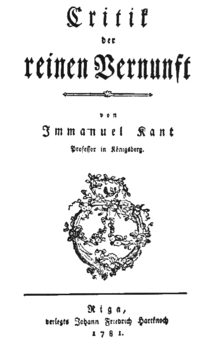Empirical realism

Title page of the 1781 edition.
|
|
| Author | Immanuel Kant |
|---|---|
| Original title | Critik a der reinen Vernunft |
| Translator | see below |
| Country | Germany |
| Language | German |
| Subject | Epistemology |
| Published | 1781 |
| Pages | 856 (first German edition) |
| aKritik in modern German. | |
The Critique of Pure Reason (German: Kritik der reinen Vernunft, KrV) (1781; second edition 1787) is a book by Immanuel Kant that is considered one of the most influential works in the history of philosophy. Also referred to as Kant's First Critique, it was followed by the Critique of Practical Reason (1788) and the Critique of Judgment (1790). In the preface to the first edition Kant explains what he means by critique of pure reason, stating "I do not mean by this a critique of books and systems, but of the faculty of reason in general, in respect of all knowledge after which it may strive independently of all experience." The Critique is an investigation into the foundations and limits of human knowledge, and the extent to which the human mind is able to engage in metaphysics. Kant builds on the work of empiricist philosophers such as John Locke and David Hume, as well as rationalists such as Gottfried Wilhelm Leibniz and Christian Wolff. He expounds new ideas on the nature of space and time, and claims to provide solutions to Hume's scepticism regarding human knowledge of the relation of cause and effect, and René Descartes' scepticism regarding knowledge of the external world. Kant claims to enact a 'Copernican revolution' in philosophy with his doctrine of transcendental idealism, according to which our knowledge does not "conform to objects", but rather objects "conform to our knowledge". According to Kant's doctrine, the human mind shapes and structures the world of experience, making knowledge possible.
Knowledge independent of experience Kant calls "a priori" knowledge, while knowledge obtained through experience is termed "a posteriori". According to Kant, a proposition is a priori if it is necessary and universal. A proposition is necessary if it could not possibly be false, and so cannot be denied without contradiction. A proposition is universal if it is true in all cases, and so does not admit of any exceptions. Knowledge gained a posteriori through the senses, Kant argues, never imparts absolute necessity and universality, because it is always possible that we might encounter an exception.
...
Wikipedia
